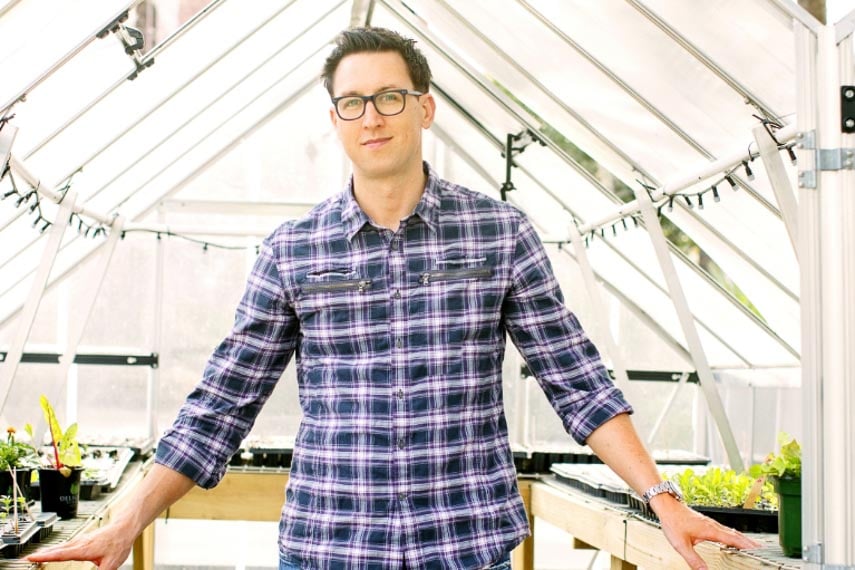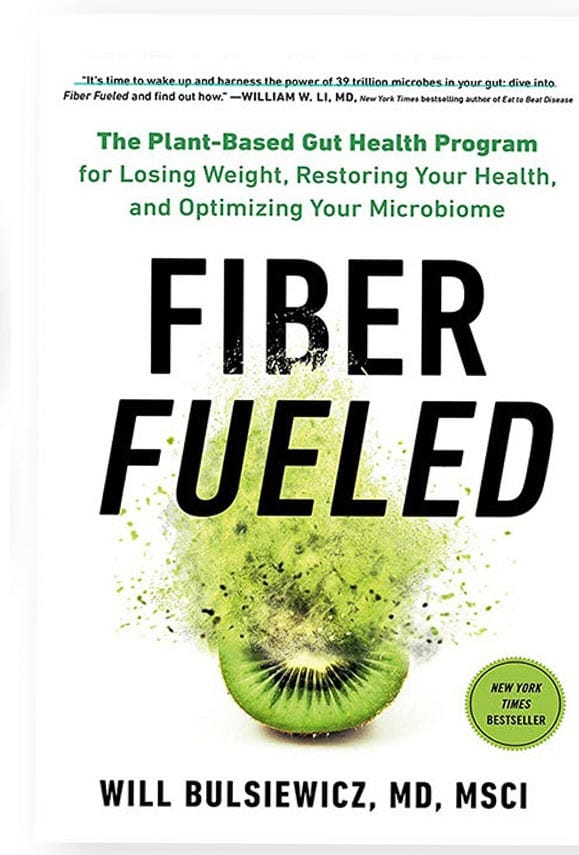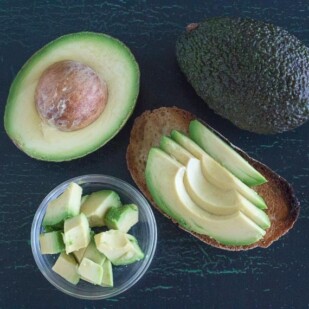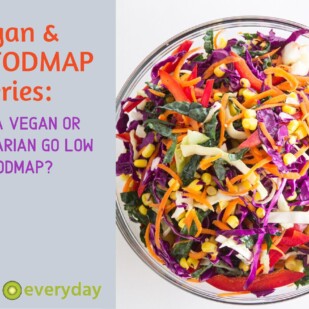The book Fiber Fueled: The Plant-Based Gut Health Program for Losing Weight, Restoring Your Health, and Optimizing Your Microbiome by Will Bulsiewicz MD came to our attention via our Success Team member Kathryn Adel, a Registered Dietitian specializing in GI health, who works with the doctor.

Kathryn told us, “he is one of the rare gastroenterologists who believes so strongly in the positive impacts that nutrition can have on gut health (and overall health) and it is a dream come true as a dietitian to have the opportunity to work with him.” Now we get a front row seat with the doctor, too.
While the book is not focused solely on IBS or the low FODMAP diet, both are addressed, and we know that our community has a keen interest in both fiber as well as plant-based eating, so we were thrilled to receive an advanced copy.
The book is a New York Times Bestseller, Publishers Weekly Bestseller, USA Today Bestseller and Indie Bound Bestseller and the #1 Bestseller on Amazon in Gastroenterology. We think you need this book on your shelf.
If you take an integrative approach to your health, are curious about how fiber plays a role in your gut health – and if you want a really entertaining read – then you will love what this book has to offer. Dr. Bulsiewicz is that rare doctor who is writing about medical issues that he himself has experienced, interweaves stories with evidence-based facts, and they are all presented in easy to understand language with equal measures of compassion and humor.
Thanks to Kathryn’s introduction, Dr. B (as he likes to be called) agreed to sit down with us for a chat.
Dédé Wilson: Dr. B, thank you so much for taking the time to speak with us and for your book. I can’t remember the last time I read a book written by a medical doctor that was so personal yet filled with science-based advice in such easy to read and understand language.
Obviously given the main title, “Fiber Fueled”, your focus is on how fiber plays a role in our gut health. You mention how we have lifestyle choices to make but that “bio-individuality” also plays a role. Can you give us a brief intro to the book and what these statements mean?
Will Bulsiewicz MD: Sadly, we have neglected the community of invisible microorganisms that resides predominantly in our colon, collectively termed our gut microbiota. And in our process of neglect, we’ve formed bad lifestyle habits that are unintentionally inflicting harm on these microbes.
It wasn’t until recently that we understood that these microbes are critical to digestion, our most life giving of bodily functions. They also play a central role in our metabolism, immune function, hormonal balance, mood and cognition, and even our genetic expression. Consider the modern epidemics of obesity, diabetes, autoimmune disease, heart disease, cancer, mood disorders and hormonal problems like endometriosis. Each of these issues can be traced back to a disturbance in our gut microbiota.
I am now of the belief that the most important part of human health isn’t even human! My book, Fiber Fueled, is about rekindling the romance with these microbes. Let’s start by acknowledging their existence, and then come to the realization that it is our diet and our lifestyle that most powerfully controls the balance of our microbes. The good news: your gut is extremely forgiving and can be healed and transformed into something better. But if you want it to heal, the path is not with supplements and there are no shortcuts. The solution is to build a diet and lifestyle centered around our microbes’ favorite food – FIBER.
And also give us a little background on your personal road to better gut health. The way you are eating now is certainly not the way it has always been!
I actually wrote this book to myself in a way. I want to connect with the person who is living on a processed meat, junk food diet because that’s the way I used to live. Go back a decade and I was thirty years old, fifty pounds (20 kilos) overweight with high blood pressure, high anxiety, low energy, and low self-esteem. I felt like I was 60!
Something had to give, but although I was chief medical resident at one of the top hospitals in the country, my medical training hadn’t prepared me to solve my own problems. I tried exercising my way out of it, but while I could build muscle and endurance, I couldn’t lose the gut or the health issues.
Things changed when I realized that the diet, I had been raised on was failing me – the standard American diet. I discovered the power of plants and started to make small changes that were adding up to huge results. The weight melted off my body, my blood pressure recalibrated, anxiety lifted, and I got reenergized, self-confident and my life back.
It was so powerful that I turned to the medical literature to see what the deal was and discovered thousands of studies that I hadn’t been taught in my medical education. So I brought this new knowledge into my gastroenterology practice and had similarly amazing results. Patients were reversing their irritable bowel, putting their colitis into remission permanently, and coming off the proton pump inhibitors for their acid reflux. Many of them lost weight, had rashes disappear, stopped having migraines, and noticed their joint pain went away.
The results were so striking that it compelled me to share the story beyond the walls of my clinic. So I reluctantly started an Instagram account – @theguthealthmd – in 2016. No one really knew who I was until 2018 when a podcast I did (Plant Proof, Episode 17) went viral.
The response was so powerful that I felt the need to a comprehensive structured resource with an introductory meal plan, so I decided to write a book. I had no clue how much work I had just agreed to! Now, after nearly two years of early mornings and late nights, Fiber Fueled launched on May 12th 2020 and was an instant New York Times, USA Today and Publishers Weekly bestseller. The success is wonderful, but it’s the messages that I receive daily from people who are transforming their health that really make it all worth it.
If we are to follow Monash University’s recommendations strictly, we know that they advise against following any other restrictive diets along with the low FODMAP diet. That said, we have community members saying all the time that they are eliminating additional foods. Nightshades and lectins come up a lot, as do Whole 30 and keto diets. Can you explain a little here about your take on these kinds of elimination diets? Maybe explain why they are so popular and why the results that folks experience might not mean what we think they mean.
The idea of food eliminations is based on an outdated philosophy in nutrition of identifying the source of our problems and removing it from our diet. This assumes that you are incapable of processing that food and incapable of restoring function to your gut, and therefore are better off removing the food and accepting the loss of unique nutrients and fiber that comes from eliminating that food from your diet.
While this philosophy may seem intuitive, modern science has shown us that it’s simply not true. You are capable of processing that food. You are capable of restoring function to your gut. And as I’m going to show you, you are not better off restricting your diet and losing the nutrients and fiber that come from that food.
What first started with the vilification of “carbs” has progressed to include the demonization of gluten, lectins, phytates, oxalates, etc. Fiber is a carb. So is granulated sugar. Should we really be lumping them in together? (No. Clearly.) Anyway, we’ve been told to throw away all grains and legumes. Or that fruit contains sugar and causes us to gain weight and therefore should be excluded from our diet.
Yet study after study after study show that the longest-lived populations on the planet eat a high “carb” diet made of real food – fruits, vegetables, whole grains, seeds, nuts and legumes. We vilify whole grains and legumes, yet our highest quality studies (systematic reviews and meta-analyses) indicate that the people who eat the most of these foods live longer with less heart disease and less cancer.
It’s time to get real and acknowledge that our fad diets were never grounded in solid evidence to begin with. Let’s reconnect with science because that’s our compass that guides us closer to better health.
I am so glad you used the “fad” word. Some folks think the low FODMAP diet is a fad. We like to differentiate by pointing out that the low FODMAP diet is clinically proven, meaning it is evidence based and therefore not a fad.
We must understand the food sensitivity generally has an explanation that starts with a damaged gut microbiota, and that the solution to healing the microbiota isn’t to eliminate the foods. That actually makes our gut weaker. At best, it is short term gain at a long-term expense. Many of my patients don’t even experience the short-term gain, so their left searching for their next food to eliminate.
Instead, we should reintroduce these foods in sufficient moderation to reduce symptoms, and then slowly increase them with time. By going low and slow, we can give our gut microbes a chance to adapt to the fiber and FODMAPs. Just as we become stronger with exercise, your gut microbes get stronger when you feed them fiber and FODMAPs and exercise them. The end result is that rather than running away from the food monsters, we can get back to having a healthy relationship with our food and actually heal our gut and restore its function in the process.
I absolutely love what you had to say about perfection – or rather that there is no need for perfection. I am going to present the quote here, and then we would appreciate if you could expound upon it:
“The important thing to remember is that it’s not about perfection.
And yes, there will be times when you’ll have gas, bloating, discomfort, or altered bowels. We all have that from time to time, me included. But what we are going to do is optimize your gut and, in doing so, make those symptoms infrequent to the point that they no longer
command your attention or affect your quality of life.”
I think it’s really important that we have a healthy relationship with our food. We have so much coming at us on a daily basis telling us what our perfect life and our perfect diet is supposed to look like. It can be overwhelming and even potentially anxiety inducing. So I believe in having a healthy mindset and reasonable expectations going into a dietary change. It’s important to not put too much pressure on yourself to be perfect. It’s also important to understand that it’s not always going to be smooth sailing. Anything good in life requires at least some amount of work to get it.
I also found your statements on training our gut to handle food sensitivities fascinating. You of course make the distinction between true food allergies (which can be life threatening) and food sensitivities, and you say that if one has a food sensitivity and the immune system is not involved that we “should be able to train your gut to be able to process” the troublesome food. Can you talk a little bit more about this please? Food sensitivities are so misunderstood – and the term is thrown around a lot improperly.
Absolutely. For evolutionary reasons, we allowed our gut microbes to become a required and critical factor in the digestion and processing of complex carbohydrates. The reason being that humans radiated out across the globe and consumed a varied and diverse diet based upon what was locally available in the ecosystem.
The enzymes that we need to break down complex carbohydrates are called glycoside hydrolases. Us big strong humans only have seventeen of them, yet our gut microbes may have up to 60,000. We rely on these enzymes to be available to us to properly digest our food. If you gut has been damaged, which we call dysbiosis, then you may lack an adequate amount of these digestive enzymes for the specific food that you’re eating.
It’s often misperceived as inflammation, but it’s not. It’s just sloppy digestion. And if you want more of those enzymes, you absolutely can train your gut to develop more by simply introducing the proper foods slowly over time.
Let’s get back to fiber in particular. The great majority of people reading this will be following the low FODMAP diet, although some might still be in Elimination while others will have progressed. Are there some general statements that you can make that connect your beliefs about fiber, IBS and the low FODMAP diet?
I want to be completely clear that my concern is with restrictive diets with permanent eliminations, particularly categorical eliminations. Whether it is the paleo diet, a gluten-free diet, or entering into permanent FODMAP restriction, in all cases we find in studies that restrictive diets cause long term harm to the microbiome.
We are constantly reinforcing this – that the “low FODMAP diet” is not just the Elimination Phase.
But on the flip side, a temporary elimination followed by reintroduction is an accepted and reasonable approach from my perspective. As I mentioned above, food sensitivity is driven by a damaged gut microbiota lacking the proper amounts of digestive enzymes to process the fiber and FODMAPs in the food you are eating. This is why virtually all patients with IBS have food sensitivities to at least some degree.
Yet, all well trained nutritionists know that fiber and FODMAPs are our prebiotic foods. They feed the microbiota. So we don’t want to eliminate these gut health promoting foods. Instead, we want to acknowledge where our food sensitivities lie, and then use that knowledge to slowly introduce fiber and FODMAPs in a low and slow fashion to allow our gut microbes an opportunity to adapt to them. What I’m saying is that a properly implemented low FODMAP diet can be a great solution to food sensitivities, but reintroduction needs to be emphasized as the critical step to long term success.
We find this is where folks get into trouble. If they are not working with a RD, the Elimination and Challenge Phases tend to be not as structured as they should be and then the person comes out the other side without clear information about their own reactions and how to move forward with expanding their diet – which is the goal. This is when we are so thankful there are RDs like Kathryn Adel!
Kathryn said to make sure to ask about the importance of the diversity of plants; that it’s not only about getting enough fiber in your day but also about getting different kinds of fibers.
We alluded to the fact that our ancestors developed a gut microbiota that was adapted to a varied and diverse diet. Fiber is not just fiber. All plants contain fiber, and each plant contains unique types of fiber. This is why we need 60,000 of these glycoside hydrolase enzymes to properly digest our food. Plants and their fiber and inherently varied and diverse.
Specific plants feed specific microbes. Our studies have shown us that, for example, if you eat black beans there are specific microbes (we call them a “guild” in research) that help you unpack your food. These are the microbes that grow stronger when you feed them black beans. These are also the same microbes that will grow weaker, recede, and eventually be incapable of doing their job if you eliminate black beans.
Our gut microbiota is an ecosystem, just like the Great Barrier Reef and the Amazon Rainforest. In any of these three ecosystems, biologists agree that there is one measure of health within the ecosystem – biodiversity. If we want a varied and diverse gut microbiota, then we need to eat a varied and diverse mix of plants to feed all those different types of microbes. This is more than just theory.
In the American Gut Project, when they performed their analysis, they found that the single greatest predictor of a healthy gut microbiome was the diversity of plants in the diet. I call this the Golden Rule of Gut Health. Counting grams of fiber is not what really matters. Counting the variety of plants within the diet is.
You have an entire chapter on fermentation and gladly pronounce your “obsession”. I have to say between kimchi and sourdough breads we have a huge contingent of community members who are in complete agreement with you. For those who perhaps have not delved into fermented foods as of yet, can you give them your plug? After all, you took the plunge yourself with making homemade sauerkraut! Why should we be paying attention to these health promoting microbe-rich foods?
Every culture in human history before us has fermented foods as a celebrated part of their food tradition. But we chose to trade in health promoting food for ones with artificial preservatives designed to retard and eliminate microbes. It’s time to put these foods back on the menu!
When I think of fermentation, I think of the word “transformation.” You start with a healthy food, but then you unlock nutrients that we wouldn’t otherwise have access to. B vitamins become available, new forms of fiber called exopolysaccharides are created, healthy acids appear and, yes, there are living microbes as well. The fermented food becomes a microbial ecosystem, well designed to be introduced to our microbial ecosystem in our gut.
You tell people to reach out to you after reading the book at https://theplantfedgut.com/. What kind of responses have you received? Are there any common denominators?
Every day I get messages from people who are adding foods back into their diet that they had eliminated and didn’t think they could tolerate, but by following my plan they’ve been able to bring them back. I get many people who tell me they’ve never felt better, that they are losing weight and their energy levels are up.
Many who are surprised at how satisfied they are after the meals in my book. (I’m not. Fiber activates the satiety hormones. Yet another perk!) And there are the many messages I’ve received where arthritis, eczema, or migraine headaches go away. While everyone has their own unique experience, suffice it to say that we all benefit when we nurture a healthy relationship with our gut microbes.
Dr. Bulsiewicz, thank you so much for your time. And we want to tell you how touched we were by your book dedication to your father who did not live to see the book’s publication. We know that somehow, he is aware of the way you are continuing to heal people with your passion and work – and as you said, carry on your family name. We hope this interview will help spread your work – and name – just a little bit further.
Thank you for allowing me to come on and thank you to Kathryn Adel for believing in me. It’s such a pleasure connecting with other health professionals who have enjoyed my book. For those interested, you can find me on Instagram and Facebook as @theguthealthmd , I have an active email list and a clinical research guide at my website theplantfedgut.com and will be launching an online course to help people who want to go beyond the book and have the complete knowledge about how to reverse dysbiosis and the heal the gut.









My health is good food
Good food is health